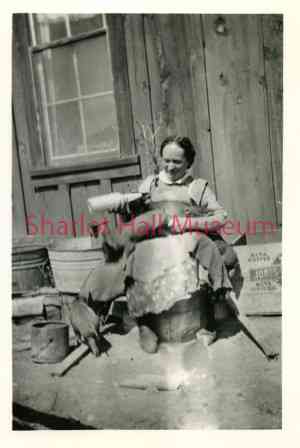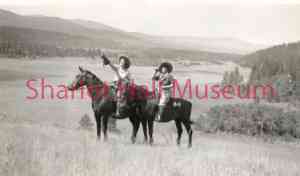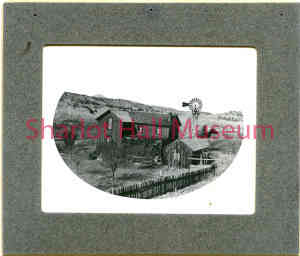By Jenny Pederson
Sharlot Hall, Sharlot Hall Museum’s founder, arrived in Arizona in 1882 with her family. Traveling the Santa Fe Trail from Kansas, they settled near Lynx Creek, about 20 miles from Prescott. By 1890, the family was running Orchard Ranch where they raised pigs and cows, grew vegetables, apples, and pears.
 Reflecting on her childhood and the valley she called home, Sharlot described the landscape as “a great stretch of hills and plain, covered thick and deep with grass.” She described the area as a “typical settlement: Fewer than a dozen families, all having about an equal number of cattle, and bound together in neighborly friendship by mutual needs and ambitions.”
Reflecting on her childhood and the valley she called home, Sharlot described the landscape as “a great stretch of hills and plain, covered thick and deep with grass.” She described the area as a “typical settlement: Fewer than a dozen families, all having about an equal number of cattle, and bound together in neighborly friendship by mutual needs and ambitions.”
As a writer, she drew inspiration from her environment and experiences. Her connection to the land is clear in a newspaper article from 1910, “I, myself, have a homestead of 160 acres, and hope to get more land. For my own experience has proved that a woman may succeed in making a comfortable living from poultry, dairying, light farming, and fruit growing.” She knew the challenges ranching families faced, including drought. In writing the poem “Drought Time” for her book, Poems of a Ranch Woman, she highlights ranchers’ fear as water levels drop:
The lean calves hide in the meager shade,
And the cows crowd close to the pole stockade,
With deep-lunged sigh; and grunt, and cough
For the scant, wet draught of the water trough.
The windmill whirls and a thin stream falls,
While a thirsty throat for each drop calls
And a woman peers down the shrinking well
With a fear too deep with words to tell.
 In the second edition of her 1924 poetry anthology, Cactus and Pine, Sharlot shared a new poem, “Away Out West,” in which she describes the openness of the land, the bigness of the sky and the opportunity they offer:
In the second edition of her 1924 poetry anthology, Cactus and Pine, Sharlot shared a new poem, “Away Out West,” in which she describes the openness of the land, the bigness of the sky and the opportunity they offer:
West, O West, where the sun each day
Bids the feet to be up and away
Where new trails run and new lands wait,
And a man and God are his only fate.
Here the far blue peaks and the valleys wide
Cleanse the heart of its hasty pride,
And the open sky and the boundless space
Carve something great on the poorest face;
Where a man’s on honor to be his best -
Away out West.
 Sharlot was a strong, hard-working woman who took her rancher role seriously. Her writings reflect this dedication and express admiration for the land and those who came west to forge new lives in an expansive, challenging landscape.
Sharlot was a strong, hard-working woman who took her rancher role seriously. Her writings reflect this dedication and express admiration for the land and those who came west to forge new lives in an expansive, challenging landscape.
Today’s ranch women continue these traditions, and as writer and rancher Mary Matli says:
There are long days and short sleeps out here in big country
An expanse that spreads as far as the eye can see
We stand tall and we ride proud
This is our country
Only for a season
To nurture
To protect
To love and glean a living from
Though none of it may ever bear our name
You’d not know that by our tending
We will cowboy [.]
Join us Saturday, February 16th at 2 p.m. for a free lecture in the West Gallery of Sharlot Hall Museum’s Lawler Exhibit Center as today’s women ranchers share their stories. The lecture highlights the book “Facing West: Voices of Western Women”, a compilation of poetry, prose, stories, songs, drawings and photography by 51 contemporary ranching women collected and published by Arizona native Sally Harper Bates.
“Days Past” is a collaborative project of the Sharlot Hall Museum and the Prescott Corral of Westerners International (www.prescottcorral.org). This and other Days Past articles are also available at https://sharlothallmuseum.org/articles/days-past-articles.l. The public is encouraged to submit proposed articles and inquiries to dayspast@sharlothallmuseum.org. Please contact SHM Library & Archives reference desk at 928-445-3122 Ext. 2, or via email at archivesrequest@sharlothallmuseum.org for information or assistance with photo requests.


